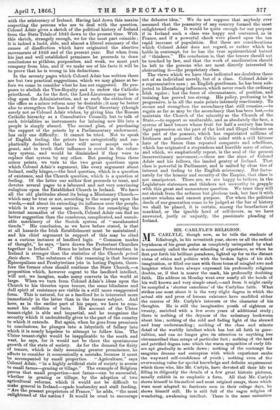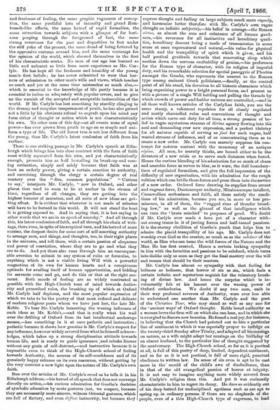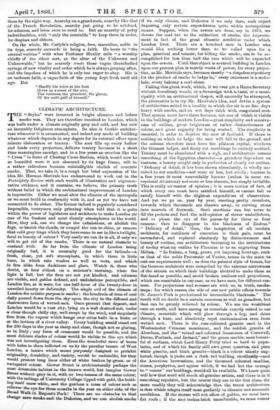MR. CARLYLE'S RELIGION.
AIR. CARLYLE, though now, as he tells the students of AL Edinburgh, in his seventieth year, shows us all the radical boyishness of his great genius as completely unimpaired by what is commonly called the sober schooling of experience, as when he first put forth his brilliant paradoxes, lighted up for us the distant vistas of ethics and politics with the broken lights of his rich imagination, or filled our ears with those tones of mingled awe and laughter which have always expressed his profoundly religious doubts, or, if that is nearer the mark, his profoundly doubting faith. His address on Monday went over nearly all the heads of his well known and very simple creed,—and from it might easily be compiled a shorter catechism' of the Carlylian faith. What strikes one most about it is the very slight degree in which the actual stir and press of human existence have modified either the centres of Mr. Carlyle's interests or the character of his thoughts. He is still the imaginative youth of eighteen or twenty, enriched with a few score years of additional study ; there is nothing of the dryness of the sedentary bookworm about him ; nothing of the cold and fading light of the shrewd and busy understanding ; nothing of the close and minute detail of the worldly intellect which has lost all faith in gene- ralities, and can no longer give its attention to anything less circumscribed than scraps of particular fact ; nothing of the hard and petrified dogma into which the warm sympathies of early life are apt gradually to settle down ; nothing of the contempt for sanguine dreams and enterprize with which experience snubs the wayward self-confidence of youth ; nothing even of the overweening value for special knowledge and definite acquirement which those who, like Mr. Carlyle, have devoted all their life to filling in diligently the details of a few great historic pictures, usually exhibit in so emphatic a form. All that Mr. Carlyle shows himself in his earliest and moat original essays, those which were most adapted to fascinate men in their college days, he shows himself still. He is still full of the vague religion of wondering, awakening intellect. There is the same animation
and freshness of feeling, the same graphic vagueness of eencep- tion, the same youthful love of' intensity and grand Rem-
brandt-like effects, the same hatred- of' vapid formalism, the same attraction: towards subjects with a glimpse of far hori- zons peeping through the foreground or fact, the same strong reverence for the past and disposition to fret under
the stiff yoke of the present, the same dread of being fettered by
the oppressive customs around him, and the same contempt for. the opinion of the world, which showed themselves in the first of his; characteristic worka: No man. of OW age has learned so little and unlearnt so little from mere experience as Mr.. Car- lyle. He has kept all the freshness and humidity of the young man's- first. beliefs; he has: never submitted to wear that har- ness, of submission M other men's wilbs and views, irhich:teachas so much and yet at the same time misteaches so much also,—
which is essential to the knowledge of life partly because it is essential to imbue us adequately with popular errors, and to give us the varnish of the accepted and acceptable insincerities of the: world. If Mr. Carlylehas lost something by sturdily clinging to the dreamy and sanguine temperament of youth, he has also gained not a little by his obstinate refusal' to engraft upon his mind any form either of thought' or action which is not characteristically his own. No other man of this day—at all events none of equal power—has ever grown from youth to age on so simple and uni- form a type of life. The' old forest tree is not less different from the young, than Mr. Carlyle's latest confession of faith from his earliest.
There is one striking passage in Mr. Carlyle's speech at Edin- burgh which brings him into close contrast with the form of faith most widely separated from diis own, and yet characteristically enough, presents him as half bewailing its break-up and com- ing extinction, simply and solely because that faith was at least an orderly power, giving a certain sanction to authority, and exercising through the clergy a certain degree of real mastery over the "dim, common populations." "Curious to say," interjects Mr. Carlyle, "now in Oxford, and other places that used to seem to lie at anchor in the stream of time, regardless of all changes, they are getting into the highest humour of mutation, and, all sorts of new ideas are get- ting afloat. It is evident that whatever is not made of asbestos will have to be burned in this world. It will not stand the heat it is getting exposed to. And in saying that, it is but saying in other words that we are in an epoch of anarchy." And all through this, his latest confessionof faith, and all through his chain of writ- ings, there runs, in spite of his sceptical turn, and his hatred of mere routine, the deepest desire for some sort of self-asserting authority to arrange men, and things, and thoughts, too, in their right places in the universe, and tell them, with a certain passion of eloquence and power of conviction, where they are to go and what they are to-do. And:yet there also runs through him an unconquer- able aversion to submit to any system of rules or formulas, to anything which is not w visible- living Will with a powerful magnetism of its own for human hearts and a conspicuous aptitude for availing itself of human opportunities, and bidding its servants come and go, and do this or that at the right mo- ment. Both moods of feeling are as widely contrasted as possible with the High-Church tone of mind towards. Autho- rity and prescribed rules, the breaking up of which at Oxford Mr. Carlyle half deplores, and the most popular expression of which we take to be the poetry of that most refined and delicate of modern religious poets whom we have just lost, the late Mr. Keble. To hear Mr. Carlyle lamenting the waning influence of such ideas as Mr. Keble's,—and that is really what his wail over the drifting of Oxford from its last intellectual anchorage means, —has something in it at once pathetic and instructive ; pathetic because it shows how genuine is Mr. Carlyle's respect for anyinfluence, however widely severed from what he himself acknow- ledges, which takes up a strong disciplinarian attitude towards human life, and is ready to guide ignorance :and rebuke licence without any grain of self-distrust,—and instructive because it is impossible even to think of the High-Church school of feeling towards Authority, the sources of its self-confidence and of its genuinely happy reliance on its own resources, without getting by the very contrast a-new light upon the nature of Mr. Carlyle's own faith.
Run over the articles of Mr. Carlyle's creed as he tells it in his Edinburgh address,—his hatred of all speech that does not converge directly on action,—his curious admiration for Goethe's doctrine of symbolic education by mute gestures (not, we suspect, because they are neeeesarily more sincere, witness Oriental gestures, which are full of flattery, and even diffuse insincerity, but because they
express thought and feeling' on large subjects much' more vaguely, and harmonize better therefore with Mr. Carbtle'ir own vague thought on infinite sobjects)i—his belief in courage—the Roman virtus, as almost the sum and substance of all' human good-
ness, —his reverence for all instinctive and hereditary quali- ties,: hereditary descent being a mode. of transmission in some sense at once supernatural and natural,—Iiis value for physical health and the tranquillity of spirit which it, gives, and his half poetical gratitude towards.- that renovating sleep which soothes down the nervous excitability of genius,..-his preference for the Roman type of character, with its religion of imperial- duty, and his remarkable selection.for special panegyric of Phocion
amongst the Greeks, who represents the nearest to the Roman type among eminent Greek politicians,—finallY, as the central point of all his creed, his devotion to all historic characters which bring organizing power to a bright personal focus, and present us with a picture of a single Will holding and pulling the threads by which crowds of poorer and feebler natures: are controlled,—and in all these well known articles of the Carlylian faith, you: see the same stamp, a vehement repulsion for all closely regulated and neatly channelled rules and conventions of thought and action which carve out duty. for all time, a strong passion of be- lief in vague mysterious streams of divine agency flowing into the soul and demanding ever new expression, and a perfect idolatry for all natures capable of serving as foci for such vague, half wasted streams of influence, and of so concentrating them as to create a new order. Mr. Carlyle can scarcely suppress his con- tempt for natures content with the monotony of an antique regime. All men, he secretly thinks, are bound either to be the dictators of a new crisis or to serve such dictators when found. Hence the curious blending of his admiration for so much-of chaos and anarchic force as serves to blur, as it were, the dull boundary- lines of regulated formalism, and give the full impression of the difficulty of new organization, with his admiration for the rough volition which can bridle these forces and press them into theservice of a new order. Ordered force drawing its supplies from- errant and vagrant force, Dantonesque audacity, Mirabeauesque intellect, Cromwellian enthusiasm and faith, all these satisfy the condi- tions of his admiration, because you see, in more or less pro- minence, in all of them, the "ragged rims of thunder. brood- ing low," as well as the glea.mi of that intelligence which can turn the brute mischief' to purposes of good. We doubt :if Mr. Carlyle ever made a hero yet of a character with- out strong. traces in it of jarring forces and half-tamed passions. It is the stormy ebullition of Goethe's- youth that helps him to , admire the placid tranquillity of his age. Mr. Carlyle does not worship even God as the creator, so much as as the subduer of the :world, as Him who can tame the wild farces of the Nature and the Man He has first created. Hence a certain lurking sympathy in him with the ferocities and passions to be subdued, which turns into dislike only so soon as they get the final mastery over the will and reason that should be their masters.
Mr. Carlyle. has almost no sympathy with that feeling for holiness as holiness, that horror of sin as sin, which feels a certain infinite and, mysterious anguish for the voluntary break- ing of divine law. And hence the surprise which is in- voluntarily felt at his lament over the waning power of Oxford orthodoxies. We doubt if any two men, each in their way profound reverers of Authority, were ever less able to understand one another than Mr. Carlyle and the poet of the Christian Year, who may stand as well as any one for the 'ancient ways' of Oxford thought. Keble loved authority as a woman loves the firm will on which she can lean, and in which she is everglael to discern new beauties. Refound a real joy, for instance, in believing that the Church had pointed out to him a particular line of sentiment in which it was especially proper to indulge on the twenty-third Sunday after Trinity, and adapted all his musings on nature, as a wife might adapt her musings on the birthday of an absent husband, to the particular line of thought suggested by the anniversary. The High-Church school, so far as it is poetical at all, is full of this poetry of deep, limited, dependent sentiment, and so far as it is not poetical, is full of mere rigid, punctual obedience to written law. Its sense of sin even is apt to be cast more in the' mould of the child's awe of disobedience, than in that of the old evangelical passion of horror at iniquity. It is not easy to imagine anything more widely severed from Mr. Carlyle's religion than this And yet it was eminently characteristic in, him to regret its decay. He does so evidently out of his deep hatred for undisciplined egotisms such as are apt to spring up in ordinary persons if there are no shepherds of the people, even of a thin High-Church type of eagerness, to lead
them by the right way. Anarchy, on a grand scale, anarchy like that
of the French Revolution, anarchy just going to be subdued, he admires; and loves even to revel in. But an anarchy of petty individualities, with "-only the constable" to keep them in order,
he- despises and abhors.
On the whole, Mr. Carlyle'-religion, free, masculine, noble in
its type, scarcely succeeds in being a faith. He bows- to- "the eternal; verities " with what Professor Huxley calls "a worship- .an inchoate faith, a vague faith of the young kept fresh until old .age. But "Hardly his voice at the best Gives us aeons° of the awe, The vastness, the grandeur, the gloom, Of the unlit gulf of himself."
































 Previous page
Previous page